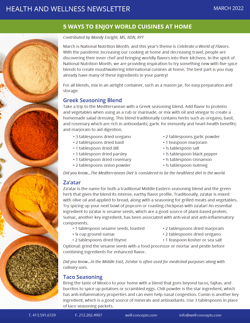5 WAYS TO ENJOY WORLD CUISINES AT HOME
Contributed by Mandy Enright, MS, RDN, RYT
March is National Nutrition Month, and this year’s theme is Celebrate a World of Flavors. With the pandemic increasing our cooking at home and decreasing travel, people are discovering their inner chef and bringing worldly flavors into their kitchens. In the spirit of National Nutrition Month, we are providing inspiration to try something new with five spice blends to create mouthwatering international cuisines at home. The best part is you may already have many of these ingredients in your pantry!
For all blends, mix in an airtight container, such as a mason jar, for easy preparation and storage.
Greek Seasoning Blend
Take a trip to the Mediterranean with a Greek seasoning blend. Add flavor to proteins and vegetables when using as a rub or marinade, or mix with oil and vinegar to create a homemade salad dressing. This blend traditionally contains herbs such as oregano, basil, and rosemary which are rich in antioxidants; garlic for immunity and heart-health benefits; and marjoram to aid digestion.
- 3 tablespoons dried oregano
- 2 tablespoons dried basil
- 1 tablespoon dried dill
- 1 tablespoon dried parsley
- 1 tablespoon dried rosemary
- 2 tablespoons onion powder
- 2 tablespoons garlic powder
- 1 teaspoon marjoram
- ½ tablespoon salt
- ½ tablespoon black pepper
- ½ tablespoon cinnamon
- ½ tablespoon nutmeg
Did you know…The Mediterranean Diet is considered to be the healthiest diet in the world.
Za’atar
Za’atar is the name for both a traditional Middle Eastern seasoning blend and the green herb that gives the blend its intense, earthy flavor profile. Traditionally, za’atar is mixed with olive oil and applied to bread, along with a seasoning for grilled meats and vegetables. Try spicing up your next bowl of popcorn or roasting chickpeas with za’atar! An essential ingredient to za’atar is sesame seeds, which are a good source of plant-based protein. Sumac, another key ingredient, has been associated with anti-viral and anti-inflammatory components.
- 1 tablespoon sesame seeds, toasted
- ¼ cup ground sumac
- 2 tablespoons dried thyme
- 2 tablespoons dried marjoram
- 2 tablespoons dried oregano
- 1 teaspoon kosher or sea salt
Optional: grind the sesame seeds with a food processor or mortar and pestle before combining ingredients for enhanced flavor.
Did you know…In the Middle East, Za’atar is often used for medicinal purposes along with culinary uses.
Taco SeasoningBring the taste of Mexico to your home with a blend that goes beyond tacos, fajitas, and burritos to spice up potatoes or scrambled eggs. Chili powder is the star ingredient, which has anti-inflammatory properties and can even help nasal congestion. Cumin is another key ingredient, which is a good source of minerals and antioxidants. Use 3 tablespoons in place of taco seasoning packets.
- 1 tablespoon chili powder
- 1 tablespoon kosher or sea salt
- 1 tablespoon smoked paprika
- 1 tablespoon cumin
- 1 tablespoon onion powder
- 1 tablespoon garlic powder
- 1 tablespoon oregano
- ½ tablespoon black pepper
Did you know…The term “taco” is what Mexican miners in the 18th century called the charges that would excavate silver, which were pieces of paper wrapped around gunpowder.
Curry Powder
Enjoy a taste of India at home by using curry powder in soups, stews, sauces, marinades, and even sprinkled over your favorite meat before grilling. Common ingredients of curry powder include turmeric and ginger, which both are known for their anti-inflammatory properties. When black pepper is used along with turmeric, there is better absorption of the nutrients.
- 2 tablespoons ground coriander
- 2 tablespoons cumin
- 1 ½ tablespoons ground turmeric
- 2 teaspoons ground ginger
- 1 teaspoon dry mustard
- ½ teaspoon black pepper
- 1 teaspoon ground cinnamon
- ½ teaspoon ground cardamom
- ½ teaspoon cayenne pepper
Did you know…Curry powder was created by the British to mimic the essence of Indian cuisine, unlike the actual dish known as a curry that is traditionally found in Indian cooking.
Jerk Seasoning
Transport yourself to the Caribbean with sweet and spicy jerk seasoning, which has both African and Jamaican origins. The blend creates a nice depth of flavors paired with a hint of sweetness, perfect to put on anything. It is best used as a dry rub for meats before roasting or grilling but can add more flavor to seafood or poultry. Spicy peppers such as cayenne or scotch bonnet provide antioxidants and may even help lower blood pressure. Allspice has many potential health benefits such as reducing inflammation, preventing infection, and relieving pain.
- 1 tablespoon onion powder
- 1 tablespoon garlic powder
- 2 teaspoons cayenne pepper
- 2 teaspoons smoked paprika
- 1 teaspoon dried thyme
- 1 tablespoon dried parsley
- ½ teaspoon cumin
- ½ teaspoon nutmeg
- ½ teaspoon cinnamon
- 1 teaspoon ground allspice
- 2 teaspoons salt
- 1 teaspoon black pepper
- ½ teaspoon red pepper flakes
- 1 tablespoon brown sugar
Did you know…British and Spanish enslaved people who escaped to the mountains of Jamaica were known as Maroons and would preserve meat by heavily seasoning it and cooking in ditches that would not allow any smoke to come through, keeping their location secret.
Which destination will you visit first on your at-home culinary adventure?
![]() Mandy Enright MS, RDN, RYT, is a Registered Dietitian, Yoga Instructor, and Corporate Wellness Expert, as well as main content contributor for Wellness Concepts. Mandy is a featured presenter, both virtually and onsite near her home in Neptune, NJ.
Mandy Enright MS, RDN, RYT, is a Registered Dietitian, Yoga Instructor, and Corporate Wellness Expert, as well as main content contributor for Wellness Concepts. Mandy is a featured presenter, both virtually and onsite near her home in Neptune, NJ.


